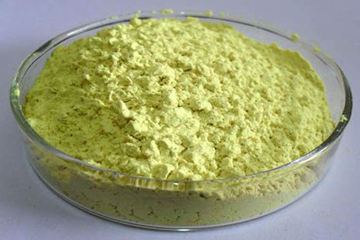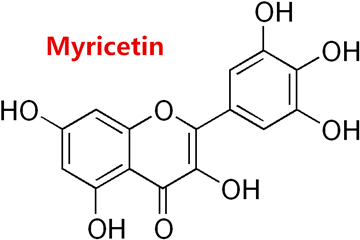Products
Myricetin
Product Name: Myricetin 
Plant source: Bark of Myrica gale L.
Structural Formula

CAS number: 529-44-2
Molecular Formula: C15H10O8
Molecular Weight: 318.24
Myricetin is a flavonoid, which is a beneficial compound found in many food sources. It is found in grapes, onions, and tea and is also available as a dietary supplement in pill form. Flavonoids such as myricetin are reputed to have several health benefits such as reducing the risk of cancer and high cholesterol reduction; it also has anti-inflammatory properties. There are no known reported side effects, but supplementation should still be discussed with a medical professional.
Flavonoids such as myricetin are found in many natural, plant based food sources. They help plants produce color in flowers and are thought to have a variety of beneficial effects on the health of animals and humans that ingest these plants. Flavonoids affect the actions of several enzymes in the body and have antioxidant properties.
Myricetin is commonly found in a range of foods. Some sources of the compound are grapes, walnuts, onions, herbs, berries, vegetables, wine, and teas. For use as a supplement, it is often harvested from a plant called Myrica cerifera, especially the roots, leaves, and bark. Supplements are usually available in pill form and should be taken with water due to the fact that myricetin is water soluble, i.e., it dissolves in water.
Function
1. One of the most touted possible effects of myricetin is in fighting cancer. As an antioxidant, it assists the body in getting rid of substances called free radicals that are involved in causing many types of cancer including prostate and lung cancer. The body's metabolism of flavonoids may also help the body eliminate other carcinogens; the effects on enzymes may also have effects on the rate of cancer growth. Study of these effects is ongoing.
2. Another reputed effect of myricetin is the reduction of cholesterol. It is supposed to inhibit the uptake, or absorption, of low density lipoprotein (LDL) cholesterol which is harmful to a person's health. It also is thought to prevent a process called oxidation of the LDL cholesterol which makes it more harmful and able to damage various body tissues. Several other flavonoids are also supposed to have similar cholesterol reduction effects.
Characteristics: Yellow fine Powder
Specification:
80%-98% Myricetin
